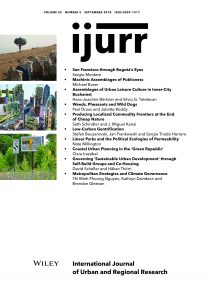Volume 42 Issue 5 September 2018
Reflections on the Print Issue
In this, my final IJURR editorial, after six years as co-editor, I want to reflect briefly on some of the trends underway within the pages of the journal and more widely within urban research and academic publishing. It is fair to say that almost all our published papers are now to a greater or lesser degree interdisciplinary: most of the key themes and debates in the pages of IJURR speak to several fields of work. Our strongest papers raise epistemological or philosophical themes that transcend current understandings of the urban and open up new sets of questions of potentially lasting significance. In working with our authors we try to ensure that each paper is designed and copy edited to produce a high quality cultural artefact that will interest as wide an international readership as possible. Our editors and reviewers often request careful reflection over the precise choice of words and the rationale for deploying particular conceptual vantage points. We encourage authors to achieve greater originality in their mode of scholarly exposition and to articulate the wider implications of their argument. Our editorial board, which meets once a year, not only reviews the progress of the journal and its effectiveness in responding to key academic developments but also continues to address strategic challenges in the world of academic publishing. It is no secret that the journal is under pressure to become a purely digital publication but I hope that our commitment to producing printed issues will continue for as long as possible and that leafing through an individual copy, with its varied juxtapositions of academic work, can spark intellectual curiosity and serve as a serendipitous inspiration for new ideas.
— Matthew Gandy
Articles
San Francisco Through Bogotá’s Eyes: Leveraging Urban Policy Change Through the Circulation of Media Objects
Published online on Aug 13th, 2018 | DOI: 10.1111/1468-2427.12655 (p 751-768)
Machinic Assemblages of Publicness
Published online on Mar 27th, 2018 | DOI: 10.1111/1468-2427.12602 (p 769-784)
Assemblages of Urban Leisure Culture in Inner‐City Bucharest
Published online on Jul 24th, 2018 | DOI: 10.1111/1468-2427.12630 (p 786-806)
Weeds, Pheasants and Wild Dogs: Resituating the Ecological Paradigm in Postindustrial Detroit
Published online on Jul 25th, 2018 | DOI: 10.1111/1468-2427.12627 (p 807-827)
Producing Localized Commodity Frontiers at the End of Cheap Nature: An Analysis of Eco‐scalar Carbon Fixes and their Consequences
Published online on Aug 13th, 2018 | DOI: 10.1111/1468-2427.12665 (p 828-844)
Low‐Carbon Gentrification: When Climate Change Encounters Residential Displacement
Published online on Jun 21st, 2018 | DOI: 10.1111/1468-2427.12634 (p 845-863)
Linear Parks and the Political Ecologies of Permeability: Environmental displacement in São Paulo, Brazil
Published online on Jul 25th, 2018 | DOI: 10.1111/1468-2427.12657 (p 864-881)
Coastal Urban Planning in The ‘Green Republic’: Tourism Development and the Nature–Infrastructure Paradox in Costa Rica
Published online on Jul 25th, 2018 | DOI: 10.1111/1468-2427.12654 (p 882-913)
Governing ‘Sustainable Urban Development’ Through Self‐Build Groups and Co‐Housing: The Cases of Hamburg and Gothenburg
Published online on Aug 14th, 2018 | DOI: 10.1111/1468-2427.12652 (p 914-933)
Metropolitan Strategies and Climate Governance: Towards New Evaluative Approaches
Published online on Aug 2nd, 2018 | DOI: 10.1111/1468-2427.12662 (p 934-951)
Book Reviews
Robert A. Beauregard 2018: Cities in the Urban Age: A Dissent. Chicago: University of Chicago Press
Published online on Aug 30th, 2018 | DOI: 10.1111/1468-2427.12685 (p 952-953)
Willem Salet 2018: Public Norms and Aspirations: The Turn to Institutions in Action. New York and London: Routledge–RTPI Library Series
Published online on Aug 30th, 2018 | DOI: 10.1111/1468-2427.12686 (p 953-955)
Andrea Fischer‐Tahir and Sophie Wagenhofer (eds.) 2017: Disciplinary Spaces: Spatial Control, Forced Assimilation and Narratives of Progress since the 19th Century. Bielefeld: Transcript
Published online on Aug 30th, 2018 | DOI: 10.1111/1468-2427.12687 (p 955-956)
Leslie Sklair 2017: The Icon Project: Architecture, Cities and Capitalist Globalization. New York: Oxford University Press
Published online on Aug 30th, 2018 | DOI: 10.1111/1468-2427.12688 (p 956-958)
Marc Pares, Sonia M. Ospina and Joan Subirats 2017: Social Innovation and Democratic Leadership: Communities and Social Change from Below. Cheltenham and Northampton: Edward Elgar
Published online on Aug 30th, 2018 | DOI: 10.1111/1468-2427.12689 (p 958-960)
Dallas Rogers 2017: The Geopolitics of Real Estate: Reconfiguring Property, Capital and Rights. London and New York: Rowman & Littlefield
Published online on Aug 30th, 2018 | DOI: 10.1111/1468-2427.12690 (p 960-962)
Jesse Goldstein 2018: Planetary Improvement: Cleantech Entrepreneurship and the Contradictions of Green Capitalism. Cambridge, MA: The MIT Press
Published online on Aug 30th, 2018 | DOI: 10.1111/1468-2427.12691 (p 962-963)
Richard Walkers 2018: Pictures of a Gone City: Tech and the Dark Side of Prosperity in the San Francisco Bay Area. Oakland, CA: PM Press
Published online on Aug 30th, 2018 | DOI: 10.1111/1468-2427.12692 (p 963-965)
Issues in this volume
January 2018
March 2018
May 2018
July 2018
September 2018
November 2018

